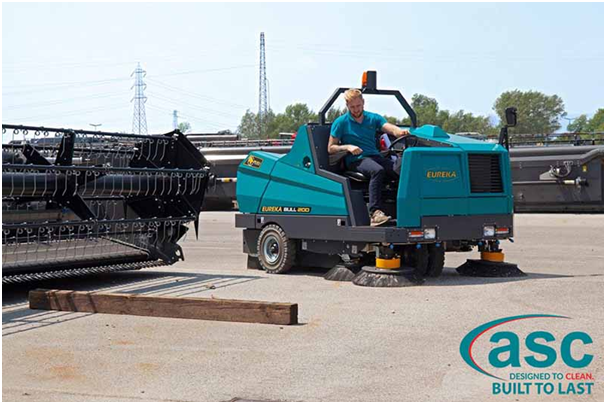For specialists who know how to do it right, running a parking lot building company may be a gratifying experience. Necessary safety precautions must be implemented to ensure that parking lot construction runs quickly and efficiently and that the lot and your workers are safe.
Some of these measures are particular to parking lot building, even if many of them are basic sense things you should be doing for any construction project. Review the suggestions below to ensure you manage your parking lot construction business appropriately.
1. Mix materials properly
Today's market offers various high-quality asphalt car park construction options, including concrete and asphalt. The most common, though, is undoubtedly asphalt. Asphalt is used to surface more than 94% of the 2.6 million miles of paved roadways in the US. Because of this, it's crucial for paving providers to comprehend the proper way to combine each of these sorts of components. Various rules must be observed to ensure that this process proceeds smoothly.
2. Hire more workers for bigger projects
Using fewer people on large projects to cut costs is dangerous. If workers aren't given time to rest, even easy paving activities can become taxing and lead to employees fainting or passing out. It's crucial to balance your workload as a result. A parking lot should contain at least ten employees per 100 square feet. That guarantees their security and reduces any resulting health hazards.
3. Work on the suitable days
Even if you and your team may have a rigorous paving plan, avoiding paving on days that might not suit your project is crucial. For instance, most asphalt car park construction materials, such as concrete and asphalt, require one to three days without rain to minimise damage. Avoid taking a chance if you come across potential rain circumstances. To avoid problems, either reschedule or cover your pavement with a tarp.
4. Handle heavy machinery appropriately
For paving, you'll need a few different types of heavy equipment, like spreaders and mixers. These devices must be carefully controlled and maintained to keep your workers safe and prevent paving damage. Give each staff member thorough instruction to ensure they comprehend these gadgets and prevent significant problems.
5. Inspect site
Before beginning any asphalt drivewayproject, it's crucial to inspect the area to make sure it's secure. For instance, you should assess the soil's condition and ensure it drains well. If it doesn't, problems like water pooling and other problems can easily harm asphalt. Using soil-strength tests and other gauges, it is essential to confirm that the soil is strong enough to support the pavement.
6. Train workers before construction
It's essential that you prepare your staff well for any potential problems. For instance, you might work on a busy motorway to keep cars away from your workers and need to understand proper cone installation. Effective lifting techniques may also be crucial because they reduce your employees' risk of back injuries.
7. Ensure first-aid knowledge
If a worker suffers a serious accident while paving, the entire team needs to be trained in first aid. First aid instruction may involve stabilising broken bones brought on by pavement injuries or bandaging wounds. To ensure your staff is safe and secure, even elementary first aid subjects, like applying sunscreen before working outside on a sunny day, are crucial.
8. Make hydration arrangements
Your business has to avoid paving for long periods in the scorching sun since it poses a severe health risk. Fortunately, having access to water on-site can help prevent dehydration and other issues. Ensure that water is readily available for the entire crew, and give each team member a personal water bottle.
9. Wear protective equipment
Workers who wear personal protective equipment avoid getting sick from hazardous substances like gases and dust produced during asphalt car park construction. These gases and particles can irritate the skin, creating respiratory and other health issues if you are not adequately protected.
Personal protection equipment also shields workers from potential physical risks associated with paving labour. Workers might, for instance, be exposed to hot liquids, sharp things, such as asphalt, and machinery. Personal protective equipment, such as heat-resistant gloves, can decrease injury risk.
Personal protection equipment also makes the workplace more visible. The equipment is primarily used by staff when operating large machines or vehicles. Workers who dress in high-visibility apparel are more visible to passersby on the job site, which reduces the likelihood of crashes and mishaps.
10. Equipment Maintenance
Equipment maintenance ensures the dependability and effectiveness of the machinery and tools on the job site. During driveway construction project, when equipment is maintained correctly, accidents and breakdowns that could endanger workers and bystanders are less likely to occur. Regular inspections, component replacement, lubrication of moving parts, and fluid level verification are all maintenance components.
Inspections are essential because they enable workers to identify and address possible risks before they escalate into more significant issues. Replacing brakes or tyres before they wear out might reduce the likelihood of an accident.
Similarly, lubricating moving parts makes them run more smoothly and reduces the likelihood of problems brought on by friction. Make sure the fluid levels are appropriate as well.
Connect with Roadseal Civil for All Your Construction Needs
Safety considerations must always come first when building a parking lot. We can safeguard the safety of both employees and potential customers by putting in place thorough safety measures, which should include appropriate signs, lighting, pedestrian routes, and structural integrity. Active safety measures prolong the life and functionality of parking lots and prevent accidents and injuries. A secure parking area enhances user satisfaction and demonstrates a dedication to public safety. It is evidence of ethical building techniques that support safety, usability, and comfort for everyone who uses these crucial areas.

 Ashish Singh
Ashish Singh



